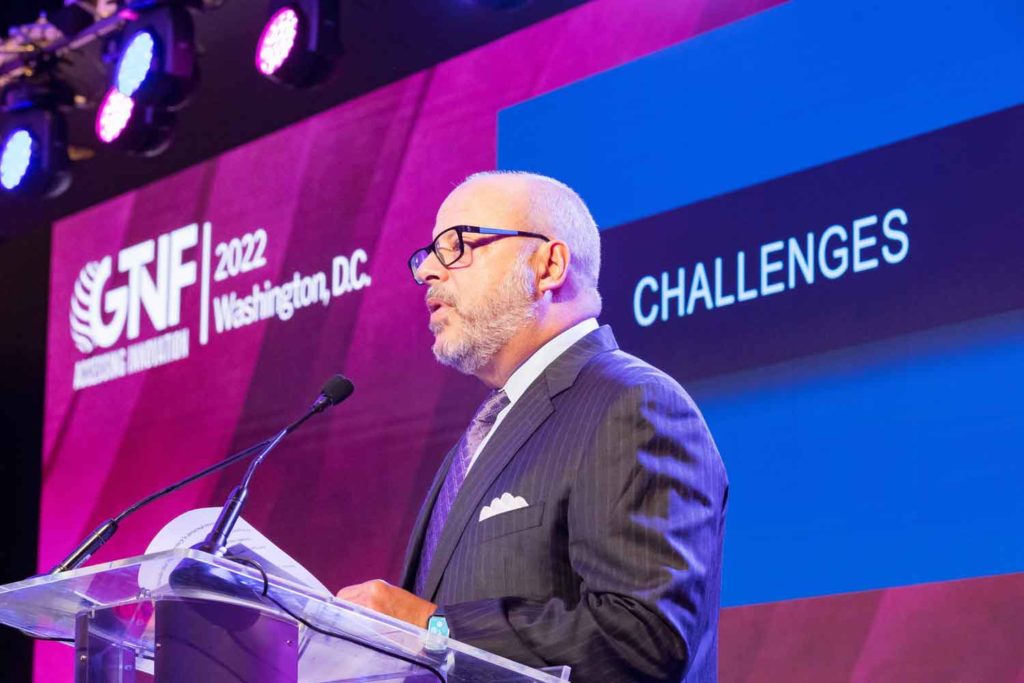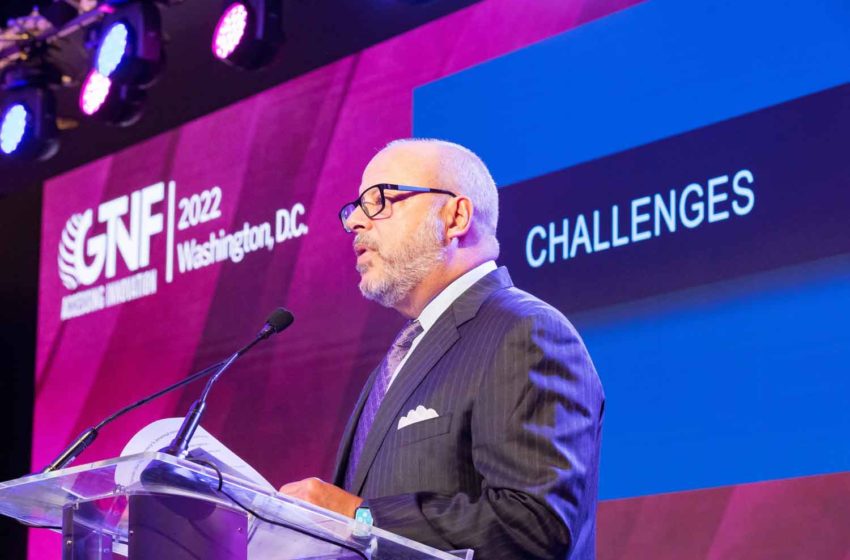
Joe Murillo is right. It is hard to believe that the U.S. Food and Drug Administration reviewed Juul’s premarket tobacco product application (PMTA) thoroughly. Murillo, chief regulatory officer for Juul Labs, told attendees of the GTNF 2022 that the regulatory agency wrongly issued Juul a marketing denial order (MDO). That order was later stayed by both a court and the FDA itself.
The FDA says it follows the science; Murillo counters that the entire process is “substantively and procedurally flawed,” adding that the MDO was not based on a fair and complete review of the science in Juul’s PMTAs.
“Our PMTAs included over 125,000 pages of data. They included information and analyses from over 110 scientific studies, and these studies cut across nonclinical, clinical and behavioral research programs,” he said. “We assessed our products relative to combustible cigarettes … and relative to other marketed [electronic nicotine-delivery system] ENDS products. It seems as though, among other things, FDA overlooked at least 6,000 pages of these data.”
Murillo said that the FDA prides itself on having the “highest scientific integrity and public health focus, shielded from political interference.” That statement mirrored what was said by the director of the FDA’s Center for Tobacco Products, Brian King, who spoke at the same conference. “Ultimately, it comes down to the science … it’s very critical, to me, to ensure that we use that as our guiding light,” King said (see “Reservations Required,” page ?).
Despite that stated commitment, the PMTA review process appears to be susceptible to politics, according to Murillo. He noted that the FDA has been under immense pressure to deny Juul Labs’ applications and remove Juul products from the U.S. market. “This political pressure cannot continue,” said Murillo. “FDA cannot allow the hostile conversations around tobacco harm reduction to seep into what should be a science and evidence-based process. The very integrity of the FDA’s review process is now called into question. The FDA must guard against politics and improper attempts to influence their scientific decision-making. We need to find common ground, turn down the temperature of the rhetoric and put people who smoke [combustible cigarettes] at the center.”
Juul Labs is now in a fight for its future. After the e-cigarette maker appealed the MDO in court, the FDA on July 5 stayed its own order. The agency announced that it would review its decision after determining that “There are scientific issues unique to this application that warrant additional review.” Alongside the agency’s internal review, Juul Labs also submitted its own administrative appeal with the FDA.
“In this appeal, we demonstrate how the agency’s denial of our applications was substantively and procedurally flawed,” said Murillo. “We requested, among other relief, that FDA rescind its denial and put our applications back into substantive review. Throughout this process, Juul products will remain on the market, and we are confident we can address any further questions the agency may have. So, we will continue to fight for the millions of adults who use our products. They deserve a complete review of the science and evidence we presented as required by law and without political interference.”
Murillo said that while underage use is a concern, last year’s National Youth Tobacco Survey (NYTS) showed a significant decline in underage use compared with just two years ago, and youth use of cigarettes continues to decline to historic lows. Murillo said the decline in underage years can be attributed to many factors, including raising the minimum purchasing age to 21 and measures to further restrict access and limit appeal.
“But not all trends related to underage use are positive. Many of us are worried about the rise of disposable flavored products among youth,” he said. “In the United States, fly-by-night companies have flooded the market with illegally marketed products. These products flout laws and regulations and present a public health danger.”
According to Murillo, regulators must improve and prioritize enforcement. “True Age, NACS and other stakeholders are firmly committed to reducing and preventing underage access to tobacco products at retail,” he said. “Scientists and public policy experts have put forward thoughtful solutions to preserve the harm reduction opportunity for adults while also protecting youth.”
Meanwhile, regulatory uncertainty has created immense barriers to innovation in reduced-risk products. This uncertainty diminishes confidence in the products themselves and the category, according to Murillo, who said that uncertainty “has a chilling effect” on investment and further innovation.
“To be crystal clear, this uncertainty only prolongs cigarette use,” he said. “Despite challenges for alternatives like ours, with the PMTA process, new combustible cigarettes continue to receive authorization via substantial equivalents and even PMTA and MRTPA [modified-risk tobacco product application] pathways; 13 years after the passage of the Tobacco Control Act, cigarettes remain far and away the most used tobacco product in the United States, making up over 75 percent of the market.
“Less than 3 percent of the total tracked ENDS market is authorized under FDA’s PMTA process … the rest of the market, the vast majority of ENDS products fall into one of three precarious buckets,” explains Murillo. “One, those being sold illegally. This includes companies that have not even submitted to the PMTAs. Two, those awaiting a marketing decision from FDA after years of review; or three, those stuck in a highly opaque administrative process—one that’s subject to a shifting requirement and unpredictable timelines.”
Innovative products that are specifically designed to advance public health have a steep road ahead in the U.S. Murillo said this is alarming. While the technology is available to accelerate the displacement of combustible cigarettes, a slow and uncertain path to the market is a significant obstacle.
“The data suggests that ENDS sales are displacing cigarette sales. So, we can see an emerging path to end the combustible cigarette once and for all. Unfortunately, that path remains blocked by a political and regulatory environment that inhibits meaningful progress … I think most of us in this room appreciate that combustible cigarettes will one day be obsolete,” he said. “Undoubtedly, that is our company’s goal. It’s not a question of whether, but of when … As an industry, we can accelerate this public health goal through product innovation and evidence-based policy development. But the viability of the marketplace is at stake, especially for those companies that don’t sell cigarettes.”
Murillo said an example of innovation in a market that is more accepting of ENDS products as a tool toward harm reduction can be found in the U.K., where Juul Labs launched its Juul 2 product last year. The platform includes cutting-edge technology designed to deliver a more consistent vapor experience with improved nicotine delivery. Its temperature control minimizes the production of toxicants, and the platform can help address underage use through its pod technology.
“We’ve also developed a mobile app that can be used for age verification and locking the device when it’s out of the range of a user’s phone,” said Murillo. “The app has other features that enhance the experience for users as they switch away from cigarettes. We’re confident that Juul 2 delivers a better experience for adult smokers than products currently available, which should result in increased switching from combustible cigarettes.”
In the end, Murillo said he is disappointed with where the ENDS industry is currently, but he has a genuine belief that there is an endgame for combustible tobacco. “Society cannot allow the death and disease associated with smoking to be a part of the incremental progress we’ve made,” he said. “Absent a renewed and fundamental commitment to the very concept of harm reduction, we will lose this opportunity.”











